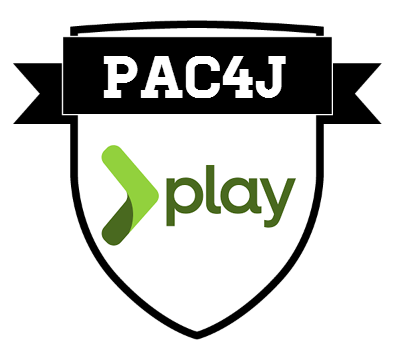https://github.com/pac4j/play-pac4j
Security library for Play framework 2 in Java and Scala: OAuth, CAS, SAML, OpenID Connect, LDAP, JWT...
https://github.com/pac4j/play-pac4j
authentication authorization cas facebook java jwt ldap login logout mongodb oauth openid-connect play-framework saml scala security social-login sql twitter
Last synced: about 2 months ago
JSON representation
Security library for Play framework 2 in Java and Scala: OAuth, CAS, SAML, OpenID Connect, LDAP, JWT...
- Host: GitHub
- URL: https://github.com/pac4j/play-pac4j
- Owner: pac4j
- License: apache-2.0
- Created: 2012-11-10T08:19:26.000Z (over 13 years ago)
- Default Branch: master
- Last Pushed: 2025-05-05T13:21:35.000Z (10 months ago)
- Last Synced: 2025-05-05T14:29:24.725Z (10 months ago)
- Topics: authentication, authorization, cas, facebook, java, jwt, ldap, login, logout, mongodb, oauth, openid-connect, play-framework, saml, scala, security, social-login, sql, twitter
- Language: Java
- Homepage: http://www.pac4j.org
- Size: 1.41 MB
- Stars: 407
- Watchers: 26
- Forks: 104
- Open Issues: 2
-
Metadata Files:
- Readme: README.md
- License: LICENSE
Awesome Lists containing this project
- awesome-scala - play-pac4j - pac4j)  (Table of Contents / Authentication)
- fucking-awesome-scala - play-pac4j - pac4j)  (Table of Contents / Authentication)
- awesome-scala - play-pac4j ★ 255 ⧗ 0 - Security library managing authentication (CAS, OAuth, OpenID, SAML, LDAP, SQL, JWT...), authorizations and logout for Play 2.x in Java and Scala. (Authentication)
README

The `play-pac4j` project is an **easy and powerful security library for Play framework v2 web applications and web services** which supports authentication and authorization, but also logout and advanced features like CSRF protection. It can work with Deadbolt.
It's based on the **[pac4j security engine](https://github.com/pac4j/pac4j)**. It's available under the Apache 2 license.
| JDK | Play version | pac4j version | play-pac4j version | Modules (Java & Scala) | Usage of Lombok | Status |
|------|--------------|---------------|--------------------|-------------------------------------------------|-----------------|------------------|
| 17 | 3.0 | 6.x | 12.0.x-PLAY3.0 | play-pac4j_2.13 play-pac4j_3 | Yes | Production ready |
| 17 | 2.9 | 6.x | 12.0.x-PLAY2.9 | play-pac4j_2.13 play-pac4j_3 | Yes | Production ready |
| 17 | 2.8 | 6.x | 12.0.x-PLAY2.8 | play-pac4j_2.12 play-pac4j_2.13 | Yes | Production ready |
| 11 | 2.8 | 5.x | 11.0.x-PLAY2.8 | play-pac4j_2.12 play-pac4j_2.13 | No | Production ready |
| 11 | 2.8 | 4.x | 10.x | play-pac4j_2.12 play-pac4j_2.13 | No | Production ready |
| 8 | 2.7 | 4.x | 9.x | play-pac4j_2.11 play-pac4j_2.12 play-pac4j_2.13 | No | Production ready |
[**Main concepts and components:**](http://www.pac4j.org/docs/main-concepts-and-components.html)
1) A [**client**](http://www.pac4j.org/docs/clients.html) represents an authentication mechanism. It performs the login process and returns a user profile. An indirect client is for UI authentication while a direct client is for web services authentication:
▸ OAuth - SAML - CAS - OpenID Connect - HTTP - Google App Engine - Kerberos - LDAP - SQL - JWT - MongoDB - CouchDB - IP address - REST API
2) An [**authorizer**](http://www.pac4j.org/docs/authorizers.html) is meant to check authorizations on the authenticated user profile(s) or on the current web context:
▸ Roles - Anonymous / remember-me / (fully) authenticated - Profile type, attribute - CORS - CSRF - Security headers - IP address, HTTP method
3) A [**matcher**](http://www.pac4j.org/docs/matchers.html) defines whether the security must be applied and can be used for additional web processing
4) The `Secure` annotation and the `Security` trait protect methods while the `SecurityFilter` protects URLs by checking that the user is authenticated and that the authorizations are valid, according to the clients and authorizers configuration. If the user is not authenticated, it performs authentication for direct clients or starts the login process for indirect clients
5) The `CallbackController` finishes the login process for an indirect client
6) The `LogoutController` logs out the user from the application and triggers the logout at the identity provider level
7) The `Pac4jScalaTemplateHelper` can be used to get the user profile(s) from a Twirl template.
## Usage
### 1) [Add the required dependencies](https://github.com/pac4j/play-pac4j/wiki/Dependencies)
### 2) Define:
### - the [security configuration](https://github.com/pac4j/play-pac4j/wiki/Security-configuration)
### - the [callback configuration](https://github.com/pac4j/play-pac4j/wiki/Callback-configuration), only for web applications
### - the [logout configuration](https://github.com/pac4j/play-pac4j/wiki/Logout-configuration)
### 3) [Apply security](https://github.com/pac4j/play-pac4j/wiki/Apply-security)
### 4) [Get the authenticated user profiles](https://github.com/pac4j/play-pac4j/wiki/Get-the-authenticated-user-profiles)
## Demos
Two demo webapps: [play-pac4j-java-demo](https://github.com/pac4j/play-pac4j-java-demo) & [play-pac4j-scala-demo](https://github.com/pac4j/play-pac4j-scala-demo) are available for tests and implement many authentication mechanisms: Facebook, Twitter, form, basic auth, CAS, SAML, OpenID Connect, JWT...
## Versions
The latest released version is available in the [Maven Central repository](https://repo.maven.apache.org/maven2).
The [next version](https://github.com/pac4j/play-pac4j/wiki/Next-version) is under development.
See the [release notes](https://github.com/pac4j/play-pac4j/wiki/Release-notes).
See the [migration guide](https://github.com/pac4j/play-pac4j/wiki/Migration-guide) as well.
## Need help?
You can use the [mailing lists](http://www.pac4j.org/mailing-lists.html) or the [commercial support](http://www.pac4j.org/commercial-support.html).